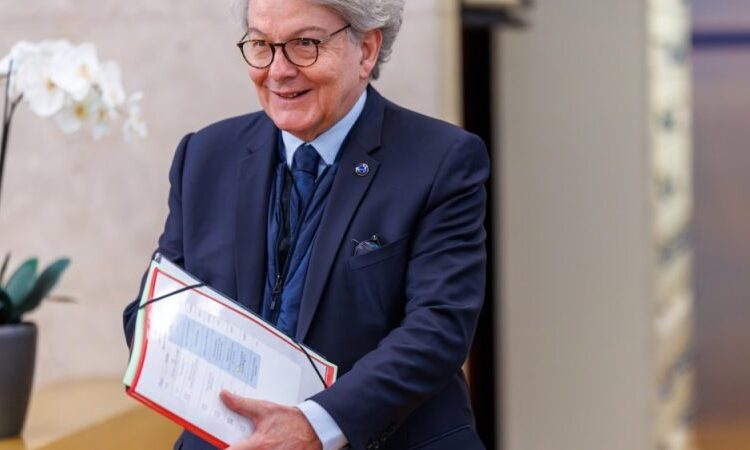
The EU should invest upfront into the bloc’s defence industry production capacity as a means to de-risk their investments, Internal Market Commissioner Thierry Breton told a group of international media, including Euractiv, on Thursday (11 January).
“We need to be able to increase our capacity without perhaps having orders in place beforehand. We are ready to review their business model with them, including upfront investment to take a risk together to increase the industrial base’s capacity,” Breton said.
The EU’s internal market boss, also responsible for the bloc’s defence industry, said he wants the EU to support defence companies upfront in their investment into defence equipment production, looking at short-term manufacturing and long-term flagship capabilities such as aircraft carriers.
The EU set up programmes and funds to incentivise member states and European industry to boost production capacity, but as governments take time to sign contracts, companies refused to invest in manufacturing and additional production lines, hampering stockpiling and fast deliveries to Ukraine.
“The problem we have is that we now need to increase our production capacity base, perhaps with a change of paradigm for the defence industries,” Breton said.
“That is all the European Defence Investment Programme’s job, the European Commission will propose in the end of February,” he said, adding that the EU’s executive had already earmarked €1,5 billion for it.
“In our team, we would like to increase it to €3 billion,” Breton added.
EDIP is expected to be proposed alongside the European Defence Industry Strategy (EDIS).
“In the context we are in, we saw the necessity to increase production capacity and equipment deliveries to Ukraine and for us [Europeans], to increase our stockpiles, to follow-up on the significant defence budget increase pledges,” Breton said. “We know how to do everything. But we need to increase production capacity”, he insisted.
“It is about Ukraine’s security and the security of the EU member states,” Breton said, voicing his belief that the war “can go on for a while”.
In the long-term, Breton reiterated that the EU should invest €100 billion into getting the bloc’s industry on a ‘war footing’.
“My personal evaluations, my ambitions are to have, long-term, around €100 billion pour have a defence readiness”, he said and compared the strategy with that of the vaccines production capacity in Europe, saying “the industrial base must always ready” to supply.
Risk-taking
Breton said he is “not in favour of unbridled public subsidies” before adding, “but sometimes you have to know how to do it to increase the industrial base’s capacity as able to always answer needs, by changing the industry’s economic model, including of profitability and risk-taking.”
The EU “is ready to take risks”, “to help the industry to take risks”, and to “accompany this boost”, he said before he called out the national government as too lax with their national arms manufacturers’ delays and price points.
“We have to be able to intervene to ensure that we help manufacturers to increase production, even if they don’t yet have the contracts yet – we are prepared to take part of the risk.”
“We’re co-financing this increase because it will help to get a return on investment that incorporates this new risk-taking”, Breton said, pitching his fund idea.
“We know how to do co-financing. We did NextGenEU [the pandemic recovery fund],” he said, adding that “there are several solutions”, and the Europeans “will have to be creative”, as he mentioned the idea of EU countries’ bringing guarantees.
European Council president Charles Michel mentioned the idea of issuing European bonds to finance defence investment last month.
Breton also said European purchases should first go to the European industry, according to the ‘European preference’ principle, with a caveat if the equipment is not available in the bloc. He also called on the European Investment Bank to step up support in the field.
Following up on the pilot project of EU’s work to boost production capacity in the bloc, the Act in Support for Ammunition Production (ASAP), the Commissioner said that 82 companies applied for EU grants to level up production capacities, and the EU executive will “select around 20” of them.
‘America first’ in the background
The commissioner stressed that the clock is ticking, as the US is going to the polls in November and may elect a president reluctant to invest in Europe’s defence and NATO, as former Republican president Donald Trump did.
“The potential candidates remind us that we must take care of EU’s defence by ourselves,” he said.
The Biden administration’s struggle to send Kyiv additional assistance “is an important trigger that casts doubt on their ability to continue supplying Ukraine as they did until now”.
[Edited by Alexandra Brzozowski/Alice Taylor]






